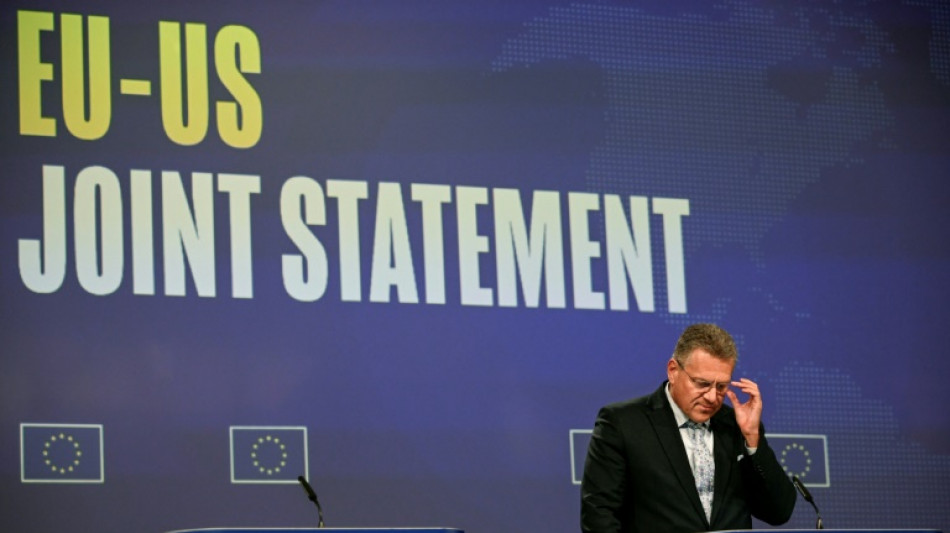

EU gets 15% US tariff for cars, but fails to get wine reprieve
The US and EU released details of a trade deal Thursday that foresees lower car tariffs but no relief for Europe's wine sector, but Brussels said it would push for further concessions.
US President Donald Trump and EU Commission President Ursula von der Leyen clinched a framework accord in July for most EU exports to face a 15-percent US levy.
But many aspects remained unclear, as the EU sought to win carve-outs for some sectors and Trump threatened higher tariffs on others.
A joint statement Thursday brought some clarity, although negotiations are not over and some moving parts remain.
The "maximum, all-inclusive" 15-percent rate would apply to the vast majority of European exports, including cars, pharmaceuticals, semiconductors and lumber, the EU said.
"This is the most favourable trade deal the US has extended to any partner," EU trade commissioner Maros Sefcovic told journalists in Brussels, explaining the levy will not come on top of existing tariffs.
In recent weeks Trump had raised the possibility of additional tariffs hitting certain sectors such as pharmaceuticals, which account for 20 percent of the EU's exports to the United States, and semiconductors.
Sefcovic said he was confident that the rate for cars, which is lower than the current 27.5 percent, will apply retroactively from August 1, having received assurances on the matter from his US counterpart.
But this will happen only once the EU introduces legislation to eliminate its own tariffs on US industrial products, something Sefcovic said the commission was "working very hard" on.
Welcoming the clarity provided by the joint statement, Sigrid de Vries, director of European auto lobby ACEA, urged the commission to implement its part of the deal "without delay, mitigating the tariff impact which already has cost automakers millions of euros in duties every day."
- Wine woes -
The 15-percent rate will also apply to wine and spirits despite a push by France, Italy and other wine-making countries to win a zero tariff exemption.
"Unfortunately, here we didn't succeed," Sefcovic said, adding negotiations would continue, but did not want to give "false promises".
"These doors are not closed forever," he said.
The French wine exporters federation said it was "hugely disappointed".
"We are certain that this will create major difficulties for the wines and spirits sector," said the head of the wine and spirits federation FEVS Gabriel Picard.
Christophe Chateau, a spokesman for a group representing Bordeaux wine producers, described this as "bad news" -- but better than the worst case scenario, with Trump that had at one point threatened tariffs as high as 200 percent.
"It further hinders the trade and export of Bordeaux wines to the United States," which is by far their largest market, Chateau told AFP.
The US Distilled Spirits Council, a trade group, also expressed disappointment, saying it favoured tariff-free trade on both sides of the Atlantic.
"These new higher tariffs on EU spirits products will further compound the challenges facing restaurants and bars nationwide," said the group's CEO, Chris Swonger.
- Bisons and planes -
French trade minister Laurent Saint-Martin said his government would seek "additional exemptions" in the trade deal.
The office of Italian Prime Minister Giorgia Meloni said the agreement was "not yet an ideal or final point" but a "trade war" had been avoided.
Under the agreement, the EU committed to significantly improving market access to a range of US seafood and agricultural goods, including tree nuts, dairy products, fruits, vegetables, pork and bison meat.
These would effectively face a "zero or close to zero" rate, the commission said.
"Faced with a challenging situation, we have delivered for our Member States and industry, and restored clarity and coherence to transatlantic trade," said commission chief Ursula von der Leyen.
"This is not the end of the process, we continue to engage with the US to agree more tariff reductions, to identify more areas of cooperation, and to create more economic growth potential".
ub-burs/jj
E.Taylor--VC







